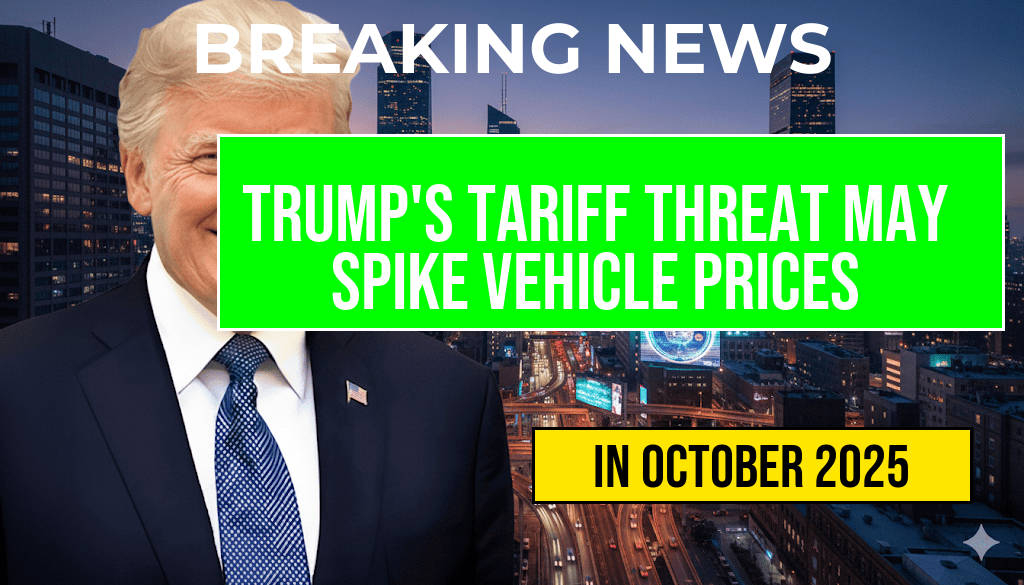Recent analysis suggests that looming tariff threats from the Trump administration could lead to a significant spike in vehicle prices, potentially increasing costs by as much as $5,286 per vehicle. This development comes as the auto industry braces for the impact of proposed tariffs on imported vehicles and parts, which could ripple through supply chains and consumer markets. The potential tariffs, aimed at boosting domestic manufacturing, raise concerns among economists and industry insiders who warn that such measures may inadvertently burden consumers with higher prices. As manufacturers evaluate their options, the ramifications of these policies could reshape the automotive landscape in the United States.
The Economic Implications of Tariffs
Tariffs, which impose additional taxes on imported goods, are designed to encourage domestic production but often have unintended consequences. According to a report by the Forbes, an increase in tariffs on automobiles could lead to various economic repercussions, including higher prices for consumers and strained relationships with trade partners.
Potential Price Increases
The projected price increase of up to $5,286 per vehicle comes from a combination of higher manufacturing costs and supply chain disruptions. Experts predict that if tariffs are enacted, car manufacturers may pass these costs onto consumers, leading to significant increases in the price of both new and used vehicles. The following factors contribute to this potential price surge:
- Increased Production Costs: Tariffs raise the cost of imported parts necessary for vehicle assembly.
- Supply Chain Disruptions: Tariffs can lead to delays and inefficiencies, further driving up costs.
- Market Reaction: Anticipated tariffs may cause consumers to rush to buy vehicles before prices rise, exacerbating price increases.
Industry Reactions and Concerns
Major automotive manufacturers have expressed concern over the proposed tariffs. In a recent statement, General Motors noted that such measures could hinder their ability to remain competitive in a global market. The New York Times highlighted that many companies rely heavily on imported components, and the increased costs could lead to reduced production and layoffs in the industry.
Impact on Consumers
The effects of rising vehicle prices are likely to be felt most acutely by consumers. As costs increase, many potential buyers may be forced to reconsider their budgets, which could lead to a decrease in overall vehicle sales. This situation could create a ripple effect, impacting not only the automotive sector but also related industries such as financing and insurance.
| Vehicle Type | Current Average Price | Projected Price Increase | New Average Price |
|---|---|---|---|
| Economy Cars | $20,000 | $3,500 | $23,500 |
| SUVs | $35,000 | $4,500 | $39,500 |
| Luxury Vehicles | $60,000 | $5,286 | $65,286 |
Long-term Considerations
As the situation develops, industry analysts are monitoring the long-term implications of these tariff threats. If implemented, the tariffs could lead to a shift in consumer behavior, with potential buyers opting for less expensive alternatives or delaying purchases altogether. Additionally, shifts in consumer demand could force manufacturers to rethink their supply chain strategies and production locations.
Conclusion
The threat of tariffs poses a complex challenge for the automotive industry and consumers alike. While the intention may be to bolster domestic manufacturing, the potential financial burden on consumers and the overall market could be substantial. As discussions continue, stakeholders will need to weigh the benefits of tariffs against their possible economic consequences.
Frequently Asked Questions
What is the main concern regarding Trump’s tariff threat on vehicles?
The main concern is that tariffs imposed on imported vehicles could lead to a significant increase in vehicle prices, potentially surging by up to $5,286.
How do tariffs affect vehicle prices?
Tariffs raise the cost of importing goods, which can result in manufacturers passing on these costs to consumers, thereby increasing the overall price of vehicles.
Who would be most impacted by the increase in vehicle prices?
The increase in vehicle prices would primarily affect consumers looking to purchase new cars, especially those in lower-income brackets who may struggle to afford the higher costs.
Are there any potential benefits to imposing these tariffs?
Proponents of tariffs argue that they can protect domestic manufacturers and create jobs in the automotive industry by making imported vehicles less competitive.
What alternatives exist to mitigate the impact of these tariffs?
Alternatives could include seeking trade agreements that lower tariffs, investing in domestic production to reduce reliance on imports, or providing subsidies to consumers to offset increased vehicle costs.

Leave a Reply